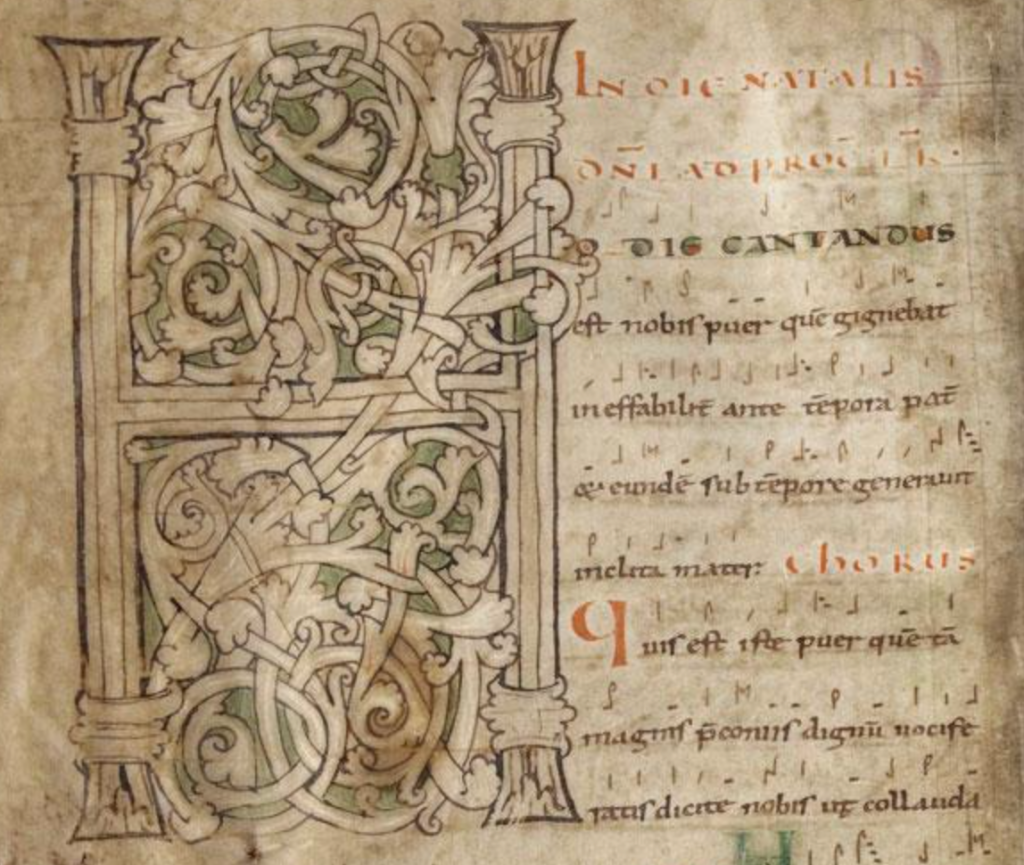| Hodie cantandus est nobis puer, quem gignebat ineffabiliter ante tempora pater, et eundem sub tempore generavit inclita mater.
Interrogatio: Responsio: Aña: |
To-day we must sing of that child, Whom His Father ineffably begot afore time, and Whom His glorious Mother bore in time.
Question: Response: Antiphon: |

Farced introits represent the largest repertory of tropes after Kyrie tropes 1, and one of the most fascinating. Like sequences, they had their origin in that hotbed of liturgical creativity that was the Abbey of St Gall in modern-day Switzerland.
The earliest account of their composition in found in the continuation of the Casus sancti Galli, a chronicle of the abbey written by Ekkehard IV. Towards the end of the ninth century, a precocious young monk (plane iuvenis acutissimus) named Tuotilo wrote introductory verses for the introit of the Mass of Christmas Day—Puer natus est—which begin Hodie cantandus est. These verses proved popular, like the sequences that Tuotilo’s confrère and close friend Notker had invented some years earlier, and Tuotilo went on to write several other tropes throughout his life. Although he was nowhere near as prolific a composer as Notker, Tuotilo’s pieces were much admired; one of those who delighted therein was Emperor Charles the Fat:
The melodies Tuotilo composed are distinctive and easily recognisable, for his music is sweeter, whether on the psaltery or the rotta, at which he excelled, as is manifest in Hodie cantandus and Omnium virtutum gemmis. Indeed, he presented these tropes to Charles to be sung at the offering the king himself would make [i.e. during the offertory of the Mass, when the king would present his offerings]. When Tuotilo had composed the offertory Viri Galilæi 2, the king even bade him to add verses, [which were,] as they say, Quoniam Dominus Jesus Christus cum esset, Omnipotens genitor, fons et origo, with the following: Gaudete et cantate, and others indeed; but we mention these, so that, if you be a musician, you might know how different his music is from that of others.3
The Hodie cantandus est trope itself is an example of the melodic peculiarity that characterises Tuotilo’s compositions: the trope is in the first mode, whereas the subsequent introit is in the seventh mode; a striking modulation in the third phrase of the trope allows it to conclude in G to match the first note of the introit.
Howsoever idiosyncratic the melody of this trope may be, its text a classic example of exegesis one expects of a trope. Its dialogical structure, reminiscent of Psalm 23, is almost catechetical—Statement, Question, Response. The statement is a dogmatic proclamation of the mystery about to be celebrated in the Mass, and it elicits the question that allows the announcement of Christ’s birth to be tied into the words of the Prophet Isaias (presagus et symnista Dei) that form the introit antiphon. And at the same time the initial proclamation is a scholium on the words Puer natus est nobis, et filius datus est nobis: this son is born in time of the blessed Virgin, but is given to us by the Father, who begot him before all ages.
The Hodie cantandus est trope enjoyed great popularity throughout the Middle Ages, and is found in liturgical books as late as the 15th century, well after the general decline in the popularity of tropes.
Tuotilo’s example, moreover, proved influential in the composition of introit tropes in the succeeding centuries. In particular, there arose an entire genre of chant verses to be sung before the introit which served almost as introductions to the feast commemorated in the Mass of the day, often labelled Tropi ad processionem in northern French manuscripts and Versus ad officium in English ones. Since they were part of the procession before Mass, or even sometimes of a pre-Mass ritual, some scholars have rather pedantically decided to argue they are not true tropes. Howbeit, in some instances they do seem to have acquired a life beyond that of a mere trope, taking advantage of the dramatic possibilities inherent in the dialogical structure of the Hodie cantandus est verses. Such is the case of the Quem quæritis dialogue on Easter, whereon we hope to dedicate a future post.

Notes
1. By way of example, in volumes I and III of the Corpus Troporum, which contain tropes for Christmastide and Eastertide respectively, one finds 1,044 introit trope verses, against 250 trope verses for offertories and 113 for communions.
2. This offertory responsory is different from the one preserved in the Tridentine missal, and can be found on pp. 4-5 here (without the added verses).
3. Que autem Tuotilo dictauerat, singularis et agnoscibilis melodie sunt, quia per psalterium seu per rotham, qua potentior ipse erat, neumata inuenta dulciora sunt, ut apparet in Hodie cantandus et Omnium uirtutum gemmis, quos quidem tropos Karolo ad offerendam quam ipse rex fecerat, obtulit canendos. Qui rex etiam Viri Galilei offerendam cum dictasset, Tuotiloni versus addere iniungit, ut aiunt: Quoniam Dominus Ihesus Christus cum esset, Omnipotens genitor, fons et origo; cum sequentibus: Gaudete et cantate, et alios quidem; sed istos proposuimus, ut quam dispar eius melodia sit ceteris, si musicus es, noris. (Ekkehard IV, Casus sancti Galli).
Perhaps this is not quite accurate, but the more I read these posts about tropes, the more I see the medieval Roman Liturgy more and more akin to the Byzantine in terms of liberties taken with biblical texts.
LikeLiked by 1 person